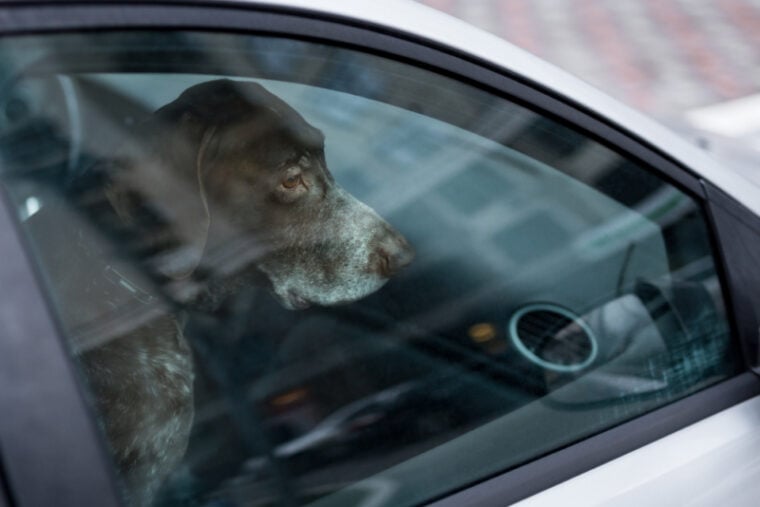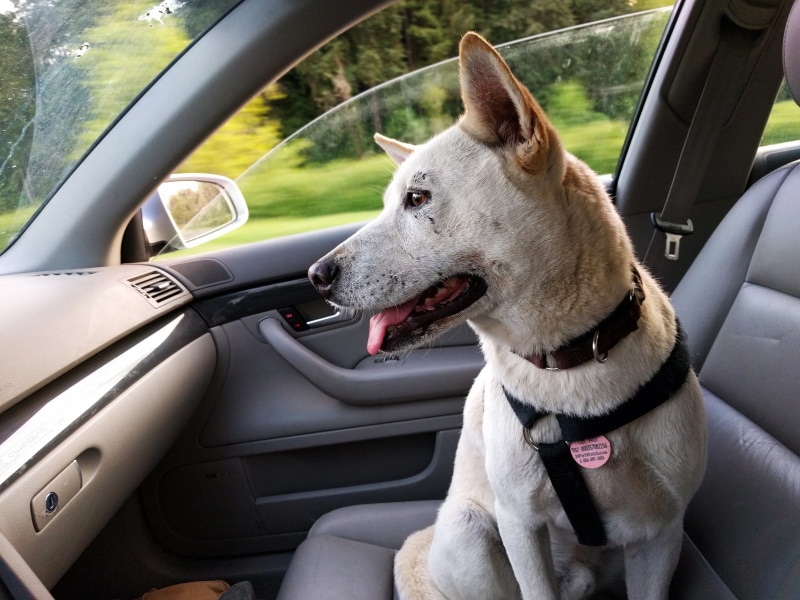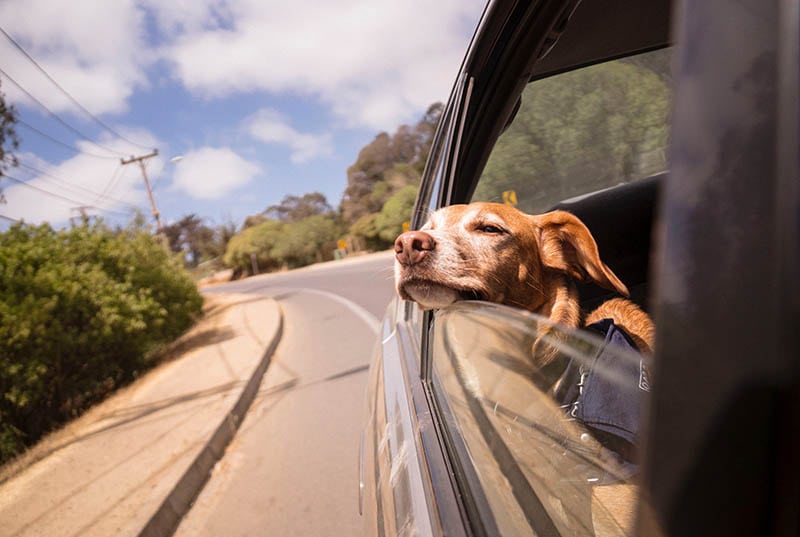
Whether you are going on a road trip or making a visit to the vet, there are times when you need to take your dog along for the ride. This can be an exciting new adventure for many dogs with their wagging tails and heads stuck out the window. But for some, the car ride may spell trouble: trouble in the form of motion sickness, that is. Just like humans, dogs can get car sick. If your dog is prone to car sickness, read through this article to learn more about motion sickness in dogs and how to treat it.
What Is Motion Sickness?
Motion sickness is something that you may have experienced before. Remember the last time you took a long car ride in the backseat or rode a roller coaster? Did you feel any creeping nausea or disorientation? If you did, those are signs of motion sickness.
Motion sickness in dogs is the same. Whether your dog travels in a car, plane, or boat, he may experience the classic signs of motion sickness. This is often because your dog’s body, eyes, and inner ears send different messages to his brain, causing disorientation.
The inner ear’s vestibular systems in charge of processing information that helps your dog to maintain balance. When the vestibular system processes information that is different from the data processed by the rest of the body, it can cause motion sickness. This is often seen in cars, where your dog’s body and eyes process that he is in a moving vehicle, but the vestibular system still thinks that he is motionless because he is sitting in a seat. The conflict of sensory input can lead to nausea and internal confusion, which are two key signs of motion sickness.
Car sickness generally lasts only as long as the car ride. The illness tends to fade gradually once your dog has returned to solid ground and his internal systems are all in agreement.

What Are the Signs of Motion Sickness?
While vomiting is an obvious sign of car sickness, you’re probably curious about other signs of motion sickness that occur before your dog throws up in the car. Watch out for physical signs, such as:
A change in emotions may also indicate that your dog is experiencing motion sickness.
Your dog may also whine, pace, or experience diarrhea when battling motion sickness. If you notice any of these behaviors or issues in your dog, pull over and walk with him on solid ground for a while. This may help to relieve some of his anxiety and return his inner sense of balance.
What Are the Causes of Motion Sickness?
The disturbance of the inner ear leads to motion sickness. However, other factors may contribute to motion sickness or even increase your dog’s chances of developing motion sickness during a car ride.
For instance, motion sickness is more often experienced in younger dogs than older ones. This is because the inner ears still need to develop fully. Since the inner ear is instrumental in providing your dog with a sense of balance, the lack of development may make your puppy more susceptible to motion sickness while in the car. If this is the cause of your dog’s motion sickness, then he may “grow out of it.”
However, that is not always the case. If your dog does not frequently take car rides, unfamiliarity may cause him stress since the sensory input will be strange to him. This can overwhelm him and cause him to associate cars with anxiety. This heightened anxiety may result in sickness, essentially inducing nausea in your dog from stress alone. This is not something he will grow out of on his own, as the issue is a psychological association rather than a lack of physical development.

How Do I Care for a Dog with Motion Sickness
A great way to care for your dog with motion sickness is to try and prevent it from occurring in the first place or at least minimize it. There are several approaches that you can take that may help your dog to experience less severe motion sickness.
Limiting your dog’s food and water before a car ride is a great way to ensure that his kibble doesn’t come back up on your car floor. Likewise, using a canine seat belt to strap him in will encourage him to face forward, which can help his sensory input to be less conflicting. Opening the windows a few inches can equalize the pressure inside and outside of the car and keep the car cool, which can help reduce nausea.
If the issue is partially or entirely psychological, there are some steps you can take to improve your dog’s mental association with cars. For instance, you can give your dog a treat each time he gets in the car or give him a toy that he is only allowed to have in the car. This can help him form pleasant associations with the car rather than negative ones. Take short trips to happy places, such as the park. If you only drive your dog to the vet, he will associate the car ride with something unpleasant at the end.
Taking short drives that gradually increase in length can be an excellent way to build up your dog’s physical or psychological tolerance. However, if your dog’s motion sickness does not fade after attempting these techniques, you may need to contact your vet about acquiring medication.
Anti-nausea or anti-anxiety medications may help to soothe your dog’s car troubles. Your vet will be able to determine which of these, if any, your dog should be taking (usually at least an hour or so in advance of the anticipated car ride). You can also talk to your vet about which dosage should be used. When giving your dog medication, it is important to always follow the instructions very carefully.
Frequently Asked Questions (FAQs)
Which Dog Breeds Are Predisposed to Motion Sickness?
There does not seem to be a correlation between breed and risk for motion sickness. All dog breeds appear to be prone to car sickness, and no matter what breed your dog is, there is no guarantee that motion sickness will not be an issue that they face.
Can Ginger Help Your Dog’s Motion Sickness?
If you have ever battled with your own motion sickness, you may have used ginger to help quell your nausea. But can ginger give the same support to dogs?
While ginger is known to be an anti-nausea supplement that can ease stomach discomfort, it should not be used as a replacement for any medication your veterinarian prescribes. Clinical studies of the effectiveness of ginger on animals are limited, so results cannot be guaranteed. Most evidence in support of ginger is anecdotal. If you are interested in trying ginger supplements for your dog, consult your vet.
How to Prepare Your Dog for a Long Drive or Road Trip
Car sickness may be an issue if you plan to take your dog on a long road trip, and you must be equipped to handle any motion sickness your dog may experience. You’ll need a canine first aid kid, his current veterinary records, and ID tags with your contact information. These will be extremely helpful in case of emergency.
Otherwise, don’t forget the food and water bowls, toys, a leash, and other important items. You can also stick to a routine of feeding, exercising, and resting to keep your pup in optimal condition.
Summary
If you take your dog on occasional or frequent car rides, finding a way to make them nausea-free is essential. Although some dogs enjoy traveling, others get sick and loathe the experience. By identifying the signs associated with your dog’s motion sickness, you can help him work through it. If your efforts don’t seem to alleviate any of your dog’s issues, consult your vet to see if prescription medications may be necessary.
Featured Image Credit: Gorloff-KV, Shutterstock








